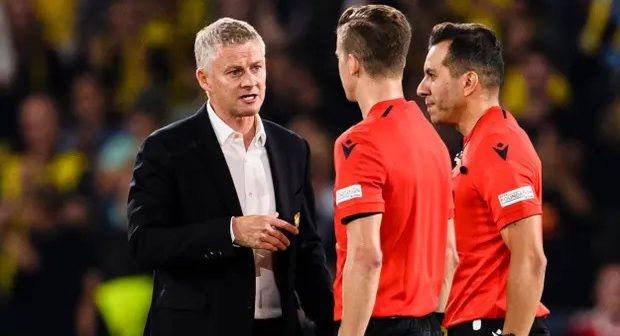With about 10 minutes to go at the Wankdorf Stadion, there was sudden uproar on the Manchester United bench. The referee, François Letexier, had failed to spot a foul on Paul Pogba and on the touchline Ole Gunnar Solskjær was joined by Bruno Fernandes and Cristiano Ronaldo, wildly gesticulating with all the righteous indignation of men who had put their 50p on the edge of the pool table and were now watching somebody else rack up the balls.
If ever there were a fitting motif for United’s surprise 2-1 defeat by Young Boys, perhaps this was it: United’s manager and perhaps their two most celebrated players fuming on the sidelines, unable to influence a thing. Instead, it was Jesse Lingard and Jordan Siebatcheu who would make the decisive contributions, the former with his shocking backpass, the latter with his grateful finish in the fifth minute of injury time.
Solskjær sought to turn the spotlight on the 32-year-old referee for failing to award a penalty to Ronaldo early in the second half. “Sometimes you get it with young refs,” he said, nonchalantly. While there are certain areas in which Solskjær can legitimately be challenged, when it comes to people being promoted into important footballing roles with only the most negligible experience, it is probably best to defer to his judgment.
As is customary in these scenarios, the captain, Harry Maguire, courageously took on the post-match duties, looking grave and repentant, like a Nasa scientist patiently explaining to the world’s media how they had accidentally managed to lose Saturn. “No footballer likes making mistakes, but we’re humans,” he said of Lingard’s error, and to be fair there was little to dispute in either part of that statement.
But the most interesting part of Maguire’s analysis was when he assessed the tactical changes that took place either side of half-time. In the immediate aftermath of Aaron Wan-Bissaka’s dismissal United were in a messy makeshift 4-4-1 with Fernandes and Pogba awkwardly patrolling the wings. After half-time Solskjær switched to a 5-3-1, and for 20 minutes after the break United were relatively secure at the back.
“The majority of their chances came late in the first half when we were playing a back four and we couldn’t get out to stop their crosses with the number of bodies they were throwing into the box,” Maguire said. “In the second half we were pretty comfortable.
“We could have done more on the ball, but in terms of the shape without the ball, I felt it was a lot better when we went to a back three. They didn’t create many chances.”
The problem was, nor did United. From the 25th minute onwards Young Boys had 15 shots on goal to United’s none. Even for a 10-man United, this was desperately thin stuff against the weakest team in their group and for all their domestic progress under Solskjær a pattern is beginning to emerge. His record in the Champions League is won four, lost seven, and in most of those defeats United have not simply been suckered but outplayed, outmanoeuvred, dominated.
But the most interesting part of Maguire’s analysis was when he assessed the tactical changes that took place either side of half-time. In the immediate aftermath of Aaron Wan-Bissaka’s dismissal United were in a messy makeshift 4-4-1 with Fernandes and Pogba awkwardly patrolling the wings. After half-time Solskjær switched to a 5-3-1, and for 20 minutes after the break United were relatively secure at the back.
“The majority of their chances came late in the first half when we were playing a back four and we couldn’t get out to stop their crosses with the number of bodies they were throwing into the box,” Maguire said. “In the second half we were pretty comfortable.
“We could have done more on the ball, but in terms of the shape without the ball, I felt it was a lot better when we went to a back three. They didn’t create many chances.”
The problem was, nor did United. From the 25th minute onwards Young Boys had 15 shots on goal to United’s none. Even for a 10-man United, this was desperately thin stuff against the weakest team in their group and for all their domestic progress under Solskjær a pattern is beginning to emerge. His record in the Champions League is won four, lost seven, and in most of those defeats United have not simply been suckered but outplayed, outmanoeuvred, dominated.
Source: Guardian

